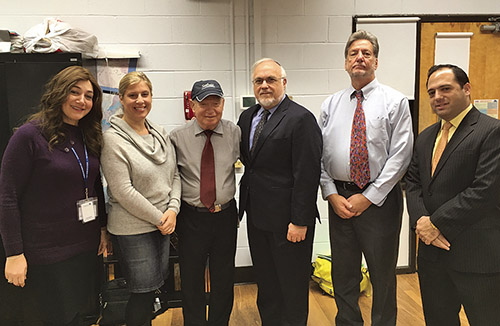

Rabbi Abraham Cooper, associate dean of the Simon Wiesenthal Center (the Center), who has been with the organization since 1977, is no stranger to the dangers of digital hate. He launched the Center’s Digital Terrorism and Hate Project over 20 years ago.
Given the proliferation of both terrorist and hate sites in recent years, the Center recently decided to embark on an ambitious initiative that would involve the nation’s school systems.
As Rabbi Cooper explained in a recent phone conversation from Israel, the outreach plan was conceived and formulated at The Center’s Los Angeles headquarters, but it was decided to initially test it in a local, controlled environment. Two schools were chosen, both in Bergen County. The first launch took place on December 5, aimed at 10th graders attending Frisch, with a program the following day for 7th graders at Moriah. The goal was to balance hard facts with a presentation that was age appropriate for both groups, then test the reaction and calibrate accordingly in advance of a rollout.
Michael Cohen, an Englewood City Councilman since 2010 and the eastern director of the Center for the past year, detailed the local effort. Six sessions were conducted at Frisch, one for each of the 10th-grade classes. At Moriah, there were two sessions, one each for the boy’s and girl’s classes. Students were shown a PowerPoint presentation with screen shots and a short video highlighting various hate groups, the extent of their following, and how they differed in approach. Some did not attempt to hide their venom, while others took a more subtle approach, trying to lure teens to their cause. Cohen referenced the American Freedom Party, a group with an innocuous name, as an example. This White Supremacist group positions itself as a credible organization of PhDs and college professors simply presenting the facts, with the goal of luring teens into the fold. Students needed to differentiate these two groups from others that don’t cross the line into hate but are only voicing their opinions, whether or not we agree with them.
As Rabbi Cooper noted, “These teenagers cannot be protected. Adults must understand that youngsters will see these things anyway.” He pointed out that while older people are horrified by some of the things they see and hear online, for most young people it was in a sense boring because they are exposed to it every day.
Along with Rabbi Cooper and Michael Cohen, a third representative of the Center present at the Bergen County launch was Rick Eaton, senior researcher at the organization for over 30 years. Eaton has spent a lifetime working undercover to infiltrate hate groups, beginning with his earlier years tracking down Nazis in South America. In his current role, he often works with intelligence officers and local police.
Each session also included the classroom teacher as well as a volunteer docent. Cohen was particularly impressed with the efforts of the docents, Tami Volodarsky, a PTA member at both Frisch and Moriah, and Sami Steigmann, a Holocaust survivor.
When asked to quantify the growth levels and scope of these terrorist and hate organizations in recent years, all three Center members in separate conversations said it had mushroomed to the point where it would be impossible to even try. Eaton sited an example of 130,000 Twitter accounts with hate hash tags closed by the company earlier this year, which reappeared in a different form later.
The Center works with major social media forces like Facebook, Google, Twitter and Instagram, and even puts out an annual report card rating how well each does in identifying and shutting down the sources. Eaton expressed frustration in trying to coax social media companies into taking the hate groups more seriously, which of course is the reason behind the Center’s high-profile annual ratings. He observed that although Facebook is the most effective among these companies, “These are the best tech people in the world and they can do a better job of identifying the haters if they take it seriously.” He went on to say “We need to have a coherent policy. This is not a first amendment issue.”
Clearly, by launching an effort meant to go national, the Center is hoping to get many more eyes and ears involved in the battle. Cohen summarized the core reasoning. “For the next generation there is so much connection with devices and social media. It’s important to let them know what’s out there, what to expect, and what they can do to help us report it.” Students were even given a new “Combat Hate” app as a means to communicate what they uncover. Rabbi Cooper stressed that the most important thing for these students to do as a first line of defense is to let their parents know if they see something that isn’t right. Echoing a sentiment similar to that of Cohen’s, he said that the Center is launching this effort to show the gravity of the situation. “It’s a signal from an important institution. Young people must be part of the strategy to combat this hate.” To that end, he said he was very impressed with the level of interest and line of questions of students in the test schools.
As for the plans of expanding the program, he said they would take it next to Los Angeles and Chicago, followed by a national expansion. He noted that the Center has contacts with many educators throughout the country. Although the program’s debut took place in Jewish day schools, the goal is to make it available for any school that is interested in helping stem the tide of hate.
For those who would like to learn more for their own school systems in the northeast, Michael Cohen can be reached at [email protected].
By Robert Isler
Robert Isler is a marketing researcher and writer who lives in Fair Lawn. He can be reached at [email protected].













